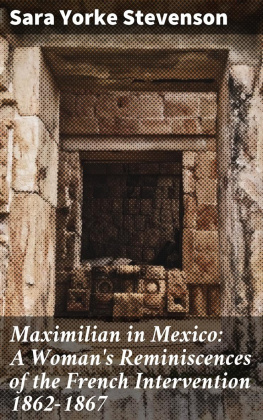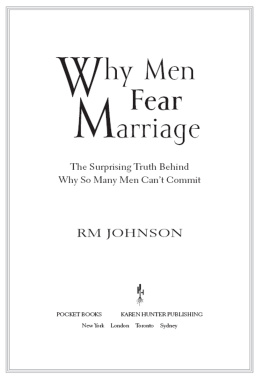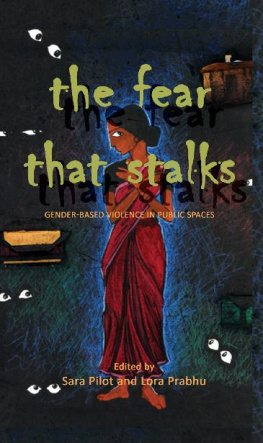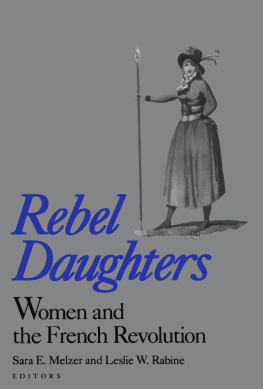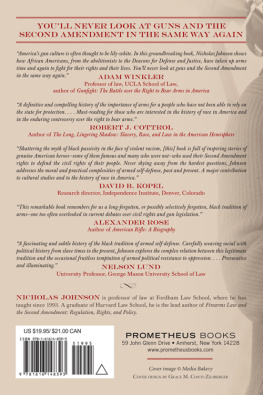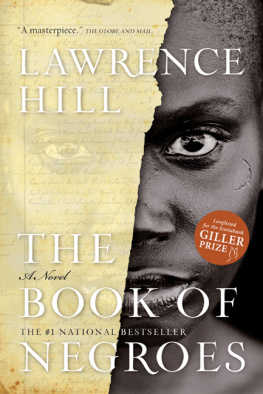Sara E. Johnson - The Fear of French Negroes
Here you can read online Sara E. Johnson - The Fear of French Negroes full text of the book (entire story) in english for free. Download pdf and epub, get meaning, cover and reviews about this ebook. year: 2012, publisher: University of California Press, genre: Romance novel. Description of the work, (preface) as well as reviews are available. Best literature library LitArk.com created for fans of good reading and offers a wide selection of genres:
Romance novel
Science fiction
Adventure
Detective
Science
History
Home and family
Prose
Art
Politics
Computer
Non-fiction
Religion
Business
Children
Humor
Choose a favorite category and find really read worthwhile books. Enjoy immersion in the world of imagination, feel the emotions of the characters or learn something new for yourself, make an fascinating discovery.

- Book:The Fear of French Negroes
- Author:
- Publisher:University of California Press
- Genre:
- Year:2012
- Rating:4 / 5
- Favourites:Add to favourites
- Your mark:
- 80
- 1
- 2
- 3
- 4
- 5
The Fear of French Negroes: summary, description and annotation
We offer to read an annotation, description, summary or preface (depends on what the author of the book "The Fear of French Negroes" wrote himself). If you haven't found the necessary information about the book — write in the comments, we will try to find it.
The Fear of French Negroes — read online for free the complete book (whole text) full work
Below is the text of the book, divided by pages. System saving the place of the last page read, allows you to conveniently read the book "The Fear of French Negroes" online for free, without having to search again every time where you left off. Put a bookmark, and you can go to the page where you finished reading at any time.
Font size:
Interval:
Bookmark:
The Fear of French Negroes
The series solicits books that consider literature beyond strictly national and disciplinary frameworks, distinguished both by their historical grounding and their theoretical and conceptual strength. We seek studies that engage theory without losing touch with history and work historically without falling into uncritical positivism. FlashPoints aims for a broad audience within the humanities and the social sciences concerned with moments of cultural emergence and transformation. In a Benjaminian mode, FlashPoints is interested in how literature contributes to forming new constellations of culture and history and in how such formations function critically and politically in the present. Available online at http://repositories.cdlib.org/ucpress .
Series Editors: Ali Behdad (Comparative Literature and English, UCLA); Judith Butler (Rhetoric and Comparative Literature, UC Berkeley), Founding Editor; Edward Dimendberg (Film & Media Studies, UC Irvine), Coordinator; Catherine Gallagher (English, UC Berkeley), Founding Editor; Jody Greene (Literature, UC Santa Cruz); Susan Gillman (Literature, UC Santa Cruz); Richard Terdiman (Literature, UC Santa Cruz)
1. On Pain of Speech: Fantasies of the First Order and the Literary Rant, by Dina Al-Kassim
2. Moses and Multiculturalism, by Barbara Johnson, with a foreword by Barbara Rietveld
3. The Cosmic Time of Empire: Modern Britain and World Literature, by Adam Barrows
4. Poetry in Pieces: Csar Vallejo and Lyric Modernity, by Michelle Clayton
5. Disarming Words: Empire and the Seductions of Translation in Egypt, by Shaden M. Tageldin
6. Wings for Our Courage: Gender, Erudition, and Republican Thought, by Stephanie H. Jed
7. The Cultural Return, by Susan Hegeman
8. English Heart, Hindi Heartland: The Political Life of Literature in India, by Rashmi Sadana
9. The Cylinder: Kinematics of the Nineteenth Century, by Helmut Mller-Sievers
10. Polymorphous Domesticities: Pets, Bodies, and Desire in Four Modern Writers, by Juliana Schiesari
11. Flesh and Fish Blood: Postcolonialism, Translation, and the Vernacular, by S. Shankar
12. The Fear of French Negroes: Transcolonial Collaboration in the Revolutionary Americas, by Sara E. Johnson
Negroes
Transcolonial Collaboration
in the Revolutionary Americas
Sara E. Johnson


THIS BOOK IS MADE POSSIBLE BY A COLLABORATIVE GRANT
FROM THE ANDREW W. MELLON FOUNDATION.
University of California Press, one of the most distinguished university presses in the United States, enriches lives around the world by advancing scholarship in the humanities, social sciences, and natural sciences. Its activities are supported by the UC Press Foundation and by philanthropic contributions from individuals and institutions. For more information, visit www.ucpress.edu .
University of California Press
Berkeley and Los Angeles, California
University of California Press, Ltd.
London, England
2012 by The Regents of the University of California
Library of Congress Cataloging-in-Publication Data
Johnson, Sara E. (Sara Elizabeth)
The fear of French negroes : transcolonial collaboration in the revolutionary Americas / Sara E. Johnson.
p. cm. (Flashpoints ; 12)
Includes bibliographical references and index.
ISBN 978-0-520-27112-8 (pbk. : alk. paper)
1. BlacksCaribbean AreaHistory19th century. 2. BlacksGulf Coast (U.S.)History19th century. 3. BlacksRace identityCaribbean AreaHistory19th century. 4. BlacksRace identityGulf Coast (U.S.)History19th century. 5. BlacksMigrationsHistory19th century. 6. HaitiHistoryRevolution, 17911804Influence. I. Title.
F2191.B55J65 2012
305.896'969729dc23
2012005111
Manufactured in the United States of America
20 19 18 17 16 15 14 13 12
10 9 8 7 6 5 4 3 2 1
In keeping with a commitment to support environmentally responsible and sustainable printing practices, UC Press has printed this book on 50pound Enterprise, a 30% post-consumer-waste, recycled, deinked fiber that is processed chlorine-free. It is acid-free and meets all ANSI/NISO (Z 39.48) requirements.
For my Egun
For Kenneth and Carolyn
For Julin and Amaya
This book was researched and written over many years, and the debts that I have incurred are numerous. Many thanks to the Library Company of Philadelphia, especially Jim Green, Philip Lapansky, and Linda Wisniewski. It was a true pleasure to work there, where I first studied many of the primary sources, both textual and visual, that I used in this and other projects. Thanks are also due to the New York Public Library, the Archives Nationales dOutre Mer, Tulane Universitys Special Collections, the Yale Center for British Art, and the Outer Banks History Center. Barbara Rust at the National Archives, Southwest Regional Office, Fort Worth, Leslie Tobias-Olsen at the John Carter Brown Library, Siva Blake at the Historical New Orleans Collection, Richard Phillips at the University of Floridas Latin American Collection, Tony Lewis at the Louisiana State Museum, and Howard Margot at the New Orleans Notarial Archives were all especially kind about answering questions and locating sources.
This project has been graciously funded by the Ford Foundation Postdoctoral Program, the University of California Presidents Postdoctoral Fellowship, the University of California San Diego Academic Senate, the Hellman Fund, and the Modern Language Initiative. Early versions of 6592; Cinquillo Consciousness: The Formation of a Pan-Caribbean Musical Aesthetic, in Music, Writing and Caribbean Unity, edited by Timothy Reiss (Trenton, NJ: Africa World Press (2005), 3558; and The Integration of Hispaniola: A Reappraisal of Haitian-Dominican Relations in the Nineteenth and Twentieth Centuries, Journal of Haitian Studies 8.2 (2002): 429. Thank you for permission to reprint.
Id also like to express my deep gratitude to the many teachers that I have had over the years. The Baltimore city public school system created and fostered my love of languages and literatures. Thanks to Ms. Celestine Carr, Mrs. Sally Daneker, and Ms. Rocca. My professors in African diaspora studies at Yale nurtured my passion for the field: Hazel Carby, Cathy Cohen, Vera Kutzinski, Chris Miller, and Robert Stepto. At Stanford, Mary Louise Pratt, Elisabeth Boyi, and Richard Rosa were the first readers and helpful critics for the early iterations of this project. Id also like to thank Al Camarillo, Claire Fox, John Rickford, Yvonne Yarbro-Bejarano, and all of the folks at Stanfords Center for Comparative Studies in Race and Ethnicity for providing such a supportive, intellectually stimulating environment. Vv A. Clark deserves special mention for teaching me what a mentor can and should be. For almost fifteen years her guidance through myriad epistemic models, backward-facing check marks in the margins of my work, and endless wisecracks provided both serious and humor-filled continuity to my work. You are deeply missed.
My intellectual debt to the scholars whose work has made this book possible are enormous. Id like to thank Judith Bettelheim, Robin Blackburn, Jean Casimir, J. Michael Dash, Joan (Colin) Dayan, Laurent Dubois, Katherine Dunham, Raul Fernndez, Sybille Fischer, Barry David Gaspar, David Geggus, Edouard Glissant, Sandra Gunning, Saidiya Hartman, C. L. R. James, Robin D. G. Kelley, Franklin Knight, Jane Landers, J. Lorand Matory, Sidney Mintz, Julius S. Scott, Rebecca J. Scott, and Michel-Rolph Trouillot for inspiring me with their engaging work on the revolutionary period in the extended Americas and the interconnections among black folk in general.
Next pageFont size:
Interval:
Bookmark:
Similar books «The Fear of French Negroes»
Look at similar books to The Fear of French Negroes. We have selected literature similar in name and meaning in the hope of providing readers with more options to find new, interesting, not yet read works.
Discussion, reviews of the book The Fear of French Negroes and just readers' own opinions. Leave your comments, write what you think about the work, its meaning or the main characters. Specify what exactly you liked and what you didn't like, and why you think so.

